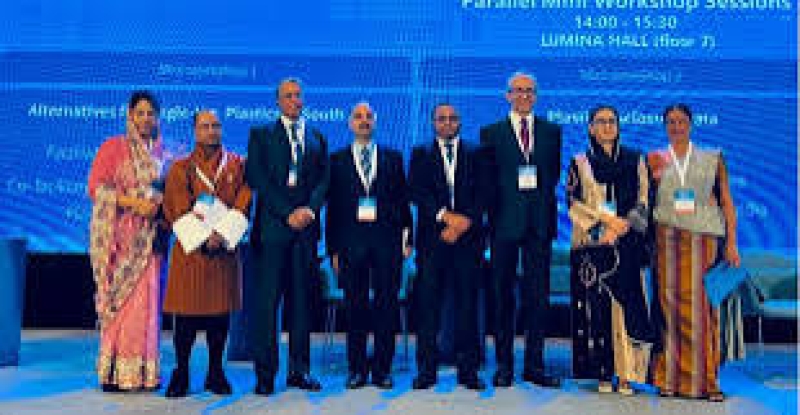- Puppet show enchants Children as Boi Mela comes alive on day 2 |
- DSCC Admin Salam’s drive to make South Dhaka a ‘clean city’ |
- 274 Taliban Dead, 55 Pakistan Troops Killed |
- Now 'open war' with Afghanistan after latest strikes |
- Dhaka's air quality fourth worst in world on Friday morning |
Bangladesh Urges South Asia to Unite Against Plastic Pollution

Bangladesh has called for a unified, regional strategy to combat the escalating plastic pollution crisis, emphasizing the need for collective action to safeguard the environment across South Asia. The country, home to some of the world's most vital river systems, has become increasingly concerned about the environmental and economic impacts of plastic waste, which crosses borders, contaminates shared waterways, and threatens both ecosystems and livelihoods.
"South Asia is grappling with an urgent plastic pollution crisis. Plastics do not respect borders—they flow through our rivers, pollute our oceans, and damage ecosystems vital to our communities. To address this growing challenge, a coordinated regional approach is essential, based on cooperation, innovation, and sustainable financial support," stated Dr. Farhina Ahmed, Bangladesh’s Environment Secretary.
The call for action was made during a high-level panel discussion on “Policy and Regulatory Challenges of Managing Plastic Waste” in Colombo, Sri Lanka, where Dr. Ahmed led a three-member delegation from Bangladesh.
She identified three critical challenges contributing to the region’s plastic waste crisis: inadequate waste management systems, including open dumping and burning; weak enforcement of existing environmental regulations; and insufficient regional collaboration on data sharing and joint monitoring efforts.
Dr. Ahmed proposed the creation of a South Asian Regional Multisectoral Plastic Action Plan that would harmonize policies aimed at building a circular economy, establish unified regulatory standards to reduce plastic production, and align regional efforts with the Global Plastics Treaty.
She also emphasized the need to enhance the recycling value chain through collaborative efforts on waste collection, sorting, and the investment in advanced recycling technologies. Bangladesh further called for a regional commitment to phasing out harmful plastics and additives while promoting the use of safer, more recyclable alternatives.
In addition, Dr. Ahmed proposed the introduction of a regional plastic waste tracking system to improve accountability and governance, as well as targeted clean-up initiatives in plastic pollution hotspots across South Asia. Strengthening law enforcement to prevent illegal plastic dumping and cross-border leakage was also a key component of her proposal.
"Global solutions alone will not suffice. South Asia must invest in innovation that reflects our unique challenges and opportunities," Dr. Ahmed said, stressing the importance of South Asia-specific research, public-private partnerships for sustainable packaging, and the use of digital tools such as AI-powered waste monitoring systems.
The panel discussion was part of the Plastic-Free Rivers and Seas Roundtable, which brought together government leaders, policy experts, and environmental advocates from across South Asia. Together, they are working to forge a cohesive and effective strategy to address plastic pollution in trans-boundary water systems and ensure a cleaner, healthier future for the region.
This collective push for regional collaboration signals a growing recognition of the need for coordinated, large-scale action to combat one of the world’s most pressing environmental issues.

